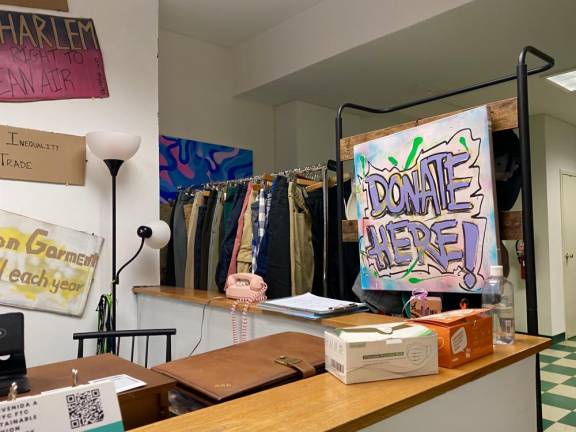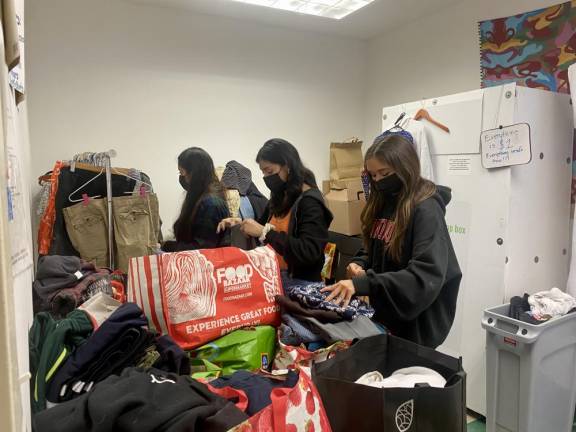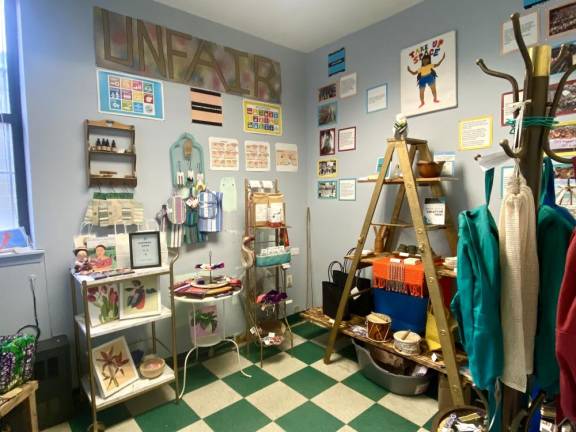Bring Five, Take Five
Meet the East Harlem thrift shop that doesn’t use price tags
It’s a Tuesday afternoon at East Harlem’s Sustainable Fashion Community Center, and tenth grader Arielle Gin is hanging up t-shirts. Across the checkered green floor she walks from the racks to an overflowing table of clothing donations where her friends are stationed, scanning textiles for stains and holes before deeming them worthy of resale. As they organize, a new pile starts to form — standout pieces the girls hope to keep for themselves at the end of their shifts.
Arielle is one of many volunteers at SFCC, a one-stop destination to swap-and-shop, donate and buy fair trade goods. From high schoolers looking to revamp their closets to homeless visitors trading ill-fitting clothing for their proper size, the multifunctional space has a place for everyone; a site of sustainability education and community building wrapped up into one.
The center works like a member-based thrift store, a contemporary approach to sustainable shopping where visitors won’t find a single price tag. Instead, non-members can pay a set amount of $15 to take home up to ten items, or, for a monthly fee, trade in used clothes for new second-hand pieces at no extra cost. On Saturdays, everything is $1. And for volunteers like Arielle, swap-and-shop comes at no monthly price.
The community center is a creative effort of the NYC Fair Trade Coalition, a nonprofit organization that supports ethically driven small businesses, with education services in anything from networking to sales. Last year SFCC was granted their own space by the pandemic-response program Enliven NYC: Storefront Startup, a collaboration between Chashama and the NYC Department of Small Business Services. The program connected lucky businesses to vacated storefronts free of rent, offering SFCC the basement of their current storefront. By July, they occupied the main floor.
“The idea for a community center came from research I did in graduate school on how to bring community back into shopping”, says Andrea Reyes, the overseer of SFCC and chairwoman of the Coalition.
“Shopping used to mean reconnecting by sharing ideas and seeing new things, but it’s become this sterile thing — people have so much stuff that they don’t have any connection to. It’s been a lot of fun to create a safe space where people don’t feel the pressure to consume or spend money.”
Packed Shelves
With their savings made on clothing, Reyes hopes visitors will be inclined to visit the fair-trade gift shop at the back of the building, a room stocked with Coalition members’ products. There, they’ll find anything from baby clothing made from unraveled sweaters to upcycled bags in Brazilian leather.
Among the packed shelves are kitchen accessories from Mayamam Weavers, a women’s cooperative of weavers and seamstresses from Guatemala that joined the Coalition in 2019. Like fellow members, their business efforts are ethically focused.
“Our priority is to promote the development of a fair-trade community in the metropolitan area,” says Jennifer Webster, the marketing manager of Mayamam Weavers. “We really enjoy being a part of this creative community of like-minded people, who passionately believe in the importance of putting people and the planet before profit.”
But SFCC’s gift shop is more than a tour around the world — it’s a chance for visitors to learn while they shop. According to the Department of Sanitation, at least 200,000 tons of textiles are thrown away by New Yorkers each year. Now, East Harlem has a new option. “That’s the larger mission of educating people on where their items are coming from and who makes them,” says Reyes. “It educates them on taking better care of their clothing or appreciating something that’s organic.”
And their efforts are certainly working. After only two months volunteering at SFCC, Arielle has already noticed a shift in how she views her clothing. “I think teenagers play an enormous role in the climate movement, especially with the rise of social media influence”, she says. “After volunteering here, I realized the environmental angle to fashion and how many people are contributing to the deterioration of our environment by throwing their old clothes away.”
“I Love the SFCC”
With an opportunity to do service work and refresh her own closet in one place, Arielle credits the center for giving her the space to connect with others who share her passions. “I love the SFCC,” she says. “Being so young, it’s amazing how much of a change I can make by just trading in my old clothes.”
Arielle’s takeaway is exactly what Reyes hoped the community would get from the center, an awareness of sustainability importance that wouldn’t require as much as a scolding for fast-fashion purchases. “I’m a firm believer that you have to meet people where they’re at,” says Reyes. “No sustainability shaming. I love that we can have that impact.”
Still, SFCC is just as community-friendly as they are environmental. With open arms the center welcomes the trans and LGBTQ+ communities, homeless shoppers and disabled volunteers. And as a result, the safe space they’ve created supports their mission to bring meaning to material goods. “[Shoppers] get rid of things here that no longer serve them and have a really positive experience,” Reyes explains. “If you bring five things, you can take five things.”
With a unique new memory attached to their shopping experience, Reyes hopes visitors will leave with a stronger connection to both their clothing and community. “I really like living in that diversity, those interactions with people who have been marginalized. Having them come in here and be treated like everyone else,” Reyes says.
“I feel like there are a lot of organizations focusing on the bad things happening, and I’m very grateful they take up that space,” Reyes adds. “It enables me to say, ‘This is the fun part.’”


